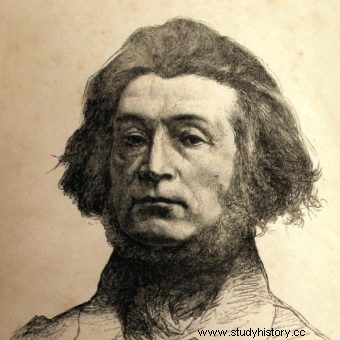
Adam Mickiewicz (photo:public domain)
Adam Mickiewicz (1798-1855)
Polish poet, political activist, considered a national bard. Adam Mickiewicz was born on December 24, 1798 in Zaosie or Nowogródek in the family of a court attorney descending from the parochial nobility. One of the formative experiences of his youth was watching Napoleon's army march towards Moscow. First he saw the triumphal march that brought hope for the end of the captivity, then he looked at the survivors defeated by the Russians.
In 1815 he went to study in Vilnius, where he engaged in patriotic activities, creating the Society of Philomats. At the end of the 1820s, he met his great love - Maryla Wereszczakówna. Due to the difficult financial situation of Mickiewicz, the mother's parents forced her to marry another, better-off candidate. For his patriotic activity, Mickiewicz was exiled deep into Russia. In 1829 he started traveling around Europe.
In 1831, he wanted to return to the country where the uprising was raging, but in the end he did not cross the border and stayed in Dresden. From there he left for Paris, where he settled permanently and married Celina Szymanowska, with whom he had six children. In the capital of France, he took up an academic career, teaching, among others, the Slavic languages (George Sand, among others, attended these lectures). Mickiewicz has become a leading representative of the so-called Great Emigration.
During the Spring of Nations, he formed a Polish legion in Rome in the service of the fighting Lombardy. The poet's last patriotic uprising came after France joined the Crimean War. The bard then set off for Constantinople, where he began to form Polish and Jewish troops (the Polish Legion, the Jewish Legion) to fight Russia. He died suddenly in 1855 during a cholera epidemic. His body was transported to France and buried in the largest Polish necropolis in Montmorency, and in 1890 he was transferred to Poland and buried at Wawel.
